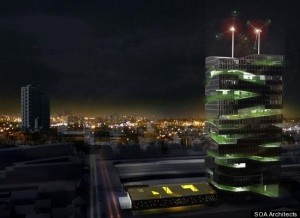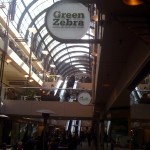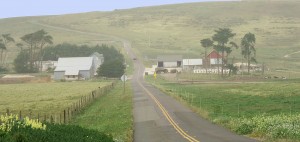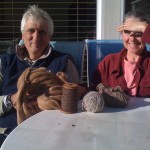Organic sustainable energy all around us
Everyday free natural organic energy greets us. It whisks and glistens through the trees, colors the morning sky and casts shadows everywhere we go. Scientist tell us in some regions of the world such as the Sahara desert, there’s enough sunlight falling within one hour to supply the energy needs of the entire planet for one year. In fact North African and European interest are gathering together in a project known as Desertec Foundation to supply renewable solar energy in North Africa, the Mediterranean and Europe. This is a massive Pyramid scale project and yet there are solar projects that are already satellite bound to orbit the earth. From satellite space stations solar photovoltaic panels will beam energy back to earth.
This is some pretty mind boggling stuff. But what can we do to live a more organic lifestyle right here, right now while utilizing the best technology can offer? Large scale solutions will not be right for everyone. In fact I’ve been communicating with people that have been involved with solar power and battery storage systems for more than 30 years. Home installed systems or portable systems could be used to power small irrigation systems. More on this later; however some answers may rest in vertical farming and urban farming where more people are gaining an incredible sense of creativity and empowerment in growing their own food or buying from local growers. In Berkeley you can go to the BeeHive Market, a green lifestyle market operating on Saturdays from 10am to 2pm in the parking lot at the Berkeley Adult School – 1701 San Pablo Avenue.
Organic living seeks to incorporate the obvious advantages of solar, energy efficiency and other renewable sources. Creative thinkers are taking a more holistic and organic approach to food, wine, water usage, health care, beauty, fashion, music, recycling and, and, and…well you can just go on. In San Francisco one place you can check out is the Environmental Action Center located in the Crocker Galleria at 55 Post Street. They provide a wealth of information and fun events to help you connect with a more organic lifestyle. You can also check out an interview QuestPoint n The Mix had with Ann Vollen Co-founder of Green Zebra, operators of The Environmental Action Center. A more organic lifestyle is not only possible, but it’s available now.
__________________________________________________
URBAN FARMING…Past Present Future
In San Francisco the value of recycling is now becoming as common place as knowing that human industrialization effects climate change. Now through the city’s recycling and composting program businesses, apartment buildings and homeowners receive incentives for actively managing their waste removal. That’s why you’re now seeing even more of those large blue, green and black containers throughout the city.

But recycling a 70 year old national government program in a new way is what San Francisco’s Victory Gardens has done. Suzi Palladino of San Francisco’s Victory Gardens recently spoke at Green Zebra, highlighted the fact that during World War Two 40% of San Franciscans were growing their own vegetables and fruit – through a national incentive program called Victory Farms. That’s 40% in land limited San Francisco! The national program was designed to ease demand for food, at a time when the country was re-directing massive food supplies to American military fighting around the world. It’s interesting to note some of the campaign material used during that time which showed how we could support our troops abroad. But none the less the idea that individuals are again being empowered to create and maintain their own backyard, rooftop and community eco farms is taking root particularly during these trying economic times.
New York City
In 2008 Victory Gardens in partnership with the city of San Francisco planted a functioning test pilot edible garden in front of City Hall which they managed for 3 months. The Victory Gardens program is where the ideas of natural living or “sustainability” as we now call it has real time application. With their help you can learn how to become an Urban Farmer and really learn how to get your green on. They can be reached at:wwwsfvictorygardens.org. You can also contact Garden for the Environment which is San Francisco’s Organic Demonstration Garden, offering weekly workshops on Organic Gardening, Sustainable Landscaping and Urban Composting, School Year and Summer Programs for Youth, and the Gardening and Composting Educator Training Program. Founded in 1990, the Garden for the Environment is a half-acre organic garden in San Francisco demonstrating small-scale urban organic food production, organic gardening, low water-use landscaping and urban compost systems.Contact at: info@gardenfortheenvironment.org.
Vertical Farming
But what about the future of urban farming? Is verticle farming in our future? It’s predicted that by the year 2050, 80% of the world’s population will live in urban centers. As the global population swells and urban centers lose what little green space they once had, more countries are looking to urban farming to feed their people. The urban environment doesn’t have unlimited horizontal farming space, so the natural solution is to build up. Vertical farms can fit easily into the cityscape while providing a local source of food for inhabitants. Even better, they can be placed nearly anywhere that a building can go.
Vertical Farming
__________________________
A Green Wave
San Francisco Green Festival just completing it’s 8th year pulled in a record of 45,000 people. Like the InterSolar convention earlier this year there was San Francisco mayor Gavin Newsom laying it down with other green leaders Phaedra Ellis Lamkins, of Green Jobs for all and Amy Goodman of Democracy Now.
The San Francisco Green Festivals, a joint project of Global Exchange and Green America, celebrates what’s working in our communities—for people, business and the environment. Here, green means safe, healthy communities and a strong local economy. The event is one of the nation’s premier sustainability events, offering the best in green. The festival had more than 350 exhibitors, 125 authors, leaders and educators; great how-to workshops; cutting-edge films; fun activities for kids; organic beer and wine; delicious vegetarian cuisine and diverse live music.
San Franciscans have caught the green wave and riding it in just about every direction.
_____________________________________________________________________
GREEN ZEBRA IN ACTION
From A to Z Green Zebra’s got all your “green” information needs covered. Recently they opened their Environmental Action Center in Crocker Galleria (50 Post Street between Montgomery and Kearny) in downtown San Francisco, where you can learn how to live more sustainably and get the “411″ on going solar without any upfront money. You got questions? The friendly staff is knowledgeable about a wide variety of environmental topics, and can assist in connecting you with the resources you’re looking for if they don’t have the answers themselves.
The Green Zebra Environmental Action Center can also serve as a great location for your green events and meetings.
Green Zebra also publishes The Green Zebra Guide which can help you Explore the best of sustainable living in San Francisco, the Peninsula and Marin County. The 2010 Green Zebra guide features articles on:
1. ✓ The Composting Ordinance
2. ✓ Raising a Healthy Green Baby
3. ✓ Turning Sunshine into Savings
4. ✓ Farmers’ Markets
5. ✓ Carsharing
6. ✓ Keeping Pesticides out of the Bay
7. ✓ Biking for a Better San Francisco
8. ✓ San Francisco Seafood Watch Alliance
9. ✓ Green Zebra’s Environmental Action Center
10. ✓ and much more!
Recently QuestPoint N The Mix interviewed co founder, Anne Vollen who shared her insights on what Green Zebra does to help people go green.
You can listen here.
Anne was also able to provide some keen insight on how the green movement has changed and where it may be headed. The Green Zebra Guide is also available online and throughout San Francisco, the Peninsula and Marin County.
_____________________________
Sustainable green eco solar organic living now
Leslie & Alden Adkins show how
That’s probably the best way to describe the Inverness Valley Inn located in the beautiful West Marin town of Inverness California. Only minutes away from Point Reyes National Seashore and Limontour Beach, the Inverness Valley Inn is a gem that sits on 15 acres. The owners Leslie and Alden Adkins are an excellent example of what going green is all about. After meeting with them for about 15 minutes I felt as if I was on the set of a remake of the hit TV sitcom Green Acres. But as Alden states so eloquently, “Leslie is to the world ecology what Zsa Zsa Gabor was to the world of cosmetics.” Leslie has an extensive background as an ecology professional and Alden was a New York, DC and San Francisco lawyer before they changed their lives to become stewards of this wonderful inn. Oh yeah there’s no Arnold the pig there but there is Coco the Icelandic sheep who’s matriarch to a mixed species crew of animals whose job is to graze daily and keep the grounds groomed. Children of all the types are dazzled by the animals’ unified efforts and unique personalities.
Inverness Valley Inn Overview
One of the first things Leslie and Alden did when they purchased the Inverness Vally Inn over three years ago was to install a 10 kilowatt solar system which now supplies power to more than half of the property. They are also considering the creation of a community garden so locals can grown their own vegetables, and allowing guests to volunteer their time if they’d like to get their hands in the earth. Leslie and Alden have been successful at creating an eco friendly inn that’s cut energy consumption and provides wonderful tranquility to urban and suburban guests who may have forgotten just how reinvigorating nature can be.
More Organic
Listen to Leslie & Alden Adkins interview here with QuestPoint in the Mix







